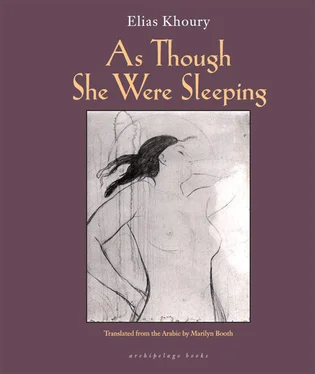But the Messiah, why bring him into this? And I don’t like this poem much.
Mansour went up to the second framed poem.
Maryam ran frightened, in search of her son
the young Yasua in that vast space
I called out, Maryam, do not fret and cry
Yasua’s at Massabki: calm be your face!
What is the Messiah doing here, in the middle of all of this? No, this isn’t real poetry, my dear.
It was on that day — the second day of their marriage — that Mansour realized he would never be able to grasp this woman who had now become his wife. He had told his mother that he had fallen in love with her for her womanliness: her tall and nicely filled-out figure, full hips, small waist — and her clear, soft pale skin, which reminded him of the beautiful pale-white figure, Daad, in The Orphan Pearl . The lines of her graceful body inhabited his imagination with the help of ten, twenty, one hundred poems singing the praises of love, in which Arab poets cataloged the innumerable desires and longings and inclinations attaching to the body of the beloved woman.
Where did those longings go? Why had this lethal sense of solitude come over Mansour? Since his brother’s death he had lived an unending maelstrom of anxiety, despair, and fear. He was not afraid of Jaffa or of war. He had decided to return to his city because it was what he had to do, and Asma, the young widow, had become his responsibility. He had even dreamed once that he had become husband to two women, Asma and Milia. And why not? He was overpoweringly hungry for it. Milia, in her eighth month of pregnancy, was astonishingly round. As she slept, her long hair flung across the pillow, he sat alone in the sitting room, sipping a cup of tea and smoking. He imagined himself between the two women and felt a quick pulsing through his veins. He was aware of how intensely bodily desire had come to possess him, as if a strong hand had seized his testicles and was squeezing them relentlessly.
Then suddenly he was undressing in the bedroom and was in bed next to Milia. He pressed his hands to her waist and the sleeping woman shifted position, turning her back to him. Her face disappeared beneath the tousled hair strewn across the pillow. He rolled over onto her body to take her. He cupped his hands over her breasts and his lips crept up her neck. And at the instant when he meant to come into her everything in him dwindled to nothing. His desire vanished as if a wave of icy water had choked the flame. Spirit abased, breath throttled, body suffocating, he moved away and lay on his back, humiliated to the core. He was certain that Milia was not asleep, that she had witnessed his collapse; she was watching it. Since the very beginning — ever since their first night at the Massabki — he had never been able to master this business of taking a sleeping woman. It left him uneasy. Yet it was a game he marveled at, as though it freed him and made him lord of the bed, as though Milia would give him what he wanted, when he wanted it, without ever calling him to account. He relished this sport that had charged his very marrow with unquenchable cravings. The woman’s restless slumber as he lay close to her had become his greatest pleasure, the source of the poetry he summoned to his lips. But now he was perplexed and his confusion left him in an agony of body and mind. How would he escape this ring of abject defeat into which he had slipped?
He got out of bed, threw on his undergarments and pajamas and heard her voice.
What’s wrong, habibi ?
He didn’t answer. He went into the bathroom and closed the door. Milia got out of bed. She knocked on the bathroom door and asked him if he was ill, and she heard his hoarse voice. It’s nothing, my dear. He told her to go back to bed and wait for him.
Mama, where are you? cried the woman lying on her bed of pain in the Italian Hospital in Nazareth. Tanyous the monk stood facing her. He stretched his hands toward her as if they were ready to bring out the newborn.
I don’t want to go to Jaffa! I want to take the boy and go to Beirut. Please, Father Tanyous, tell my mother to come and get me. No, no — tell my brother Musa to come and find me so that we can make an escape from here.
The Master, peace be upon Him, Tanyous said, went to his death of his own will. Tanyous opened the book and began to read. Milia did not understand the Syriac words that the Lebanese monk’s mouth formed, yet she saw Him, walking through the streets of Jerusalem on the way to Golgotha carrying an enormous wooden cross, soldiers all around him, walking on and on as the whip tore into his back, gazing forward to see only the face of Maryam the Majdaliyya, now so perfectly like his own mother’s face. He bent double to shelter the pain through his body, wounded by the implacable whipping. He gazed into the distance and saw Ibrahim the Friend of God walking behind his son, as Ishaq bore on his back the wood his father had gathered for the sacrifice: the son, bent in obedience.
Did he know? Or did the father hide the truth from his son?
That was the question Yasua of Nazareth put to his father Yusuf the Carpenter as they sat together and mended their relationship after the father confessed to his son that he had intended to kill him but that he understood now that this had reflected the will of God.
So, you are just like Ibrahim, said Yasua. You were intending to kill me just like he meant to kill his son and offer him as a sacrifice to his god.
Son, a father does not kill his own son, said Yusuf, grief in his eyes. My eyes were veiled by a black cloud and I hesitated — I did not know what to do. Now it’s over. You are my only son — is there anyone who would kill his only son?
And what about him?
I don’t know. I expect that Ibrahim did not know about the sheep. He heard Allah’s command in his dream. He couldn’t act against it, could he?
I’m asking you about Ishaq.
No, that was not how the story went. Where did that story come from, the tale of the father’s flight? Father Tanyous told her a different version, but then why did she see the son standing before the fire with a knife in his hand? And where had the fire come from? Maryam stood trembling as she faced the Mount of Qafzeh in Nazareth, but she saw no fire. She saw him, and she saw that they wanted to cast him into the steep valley; she stood at the rim of the wadi and trembled. Here, pausing before the courtyard of the church they called Our Lady of the Tremblings, the pregnant woman who has come from Beirut, under the cover of darkness, trembles in the cold air. Father Tanyous asks her why she has come to the church in her nightgown and she replies that she did not realize. I am asleep, Father. I am dreaming. This is all a dream; it has nothing to do with what is happening out there. What has pulled you into my dreaming? Now I am going to open my eyes, find myself in the house, and you will no longer be in front of me.
No, don’t open your eyes, says Tanyous, because there’s something very important I need to tell you.
The monk reads the story of the merciful Friend Khalil Ibrahim with his son. Do you know why Hebron is called the City of Khalil? His grave is there and his real name is Khalil because he was the friend of Abu Issa.
Abu Issa? But just who is the Father of Issa? she asked.
I see that you don’t read books, my girl. Perhaps you do have good reason not to know something in a book that will be written in Beirut fifty years from now. How could you read this book if it is yet to be written?
But you — how can you read something before it’s written?
Because I read eyes. And you too, Milia. You will read things before they are written. You will read them in the moment the ancient man stands before your bed in the Italian Hospital and says, Now, Master. The time has come to release Your servant.
Читать дальше












